 Blog
Blog B2B Survey Provider: What to Look for in 2025
B2B Survey Provider: What to Look for in 2025B2B Survey Provider: What to Look for in 2025
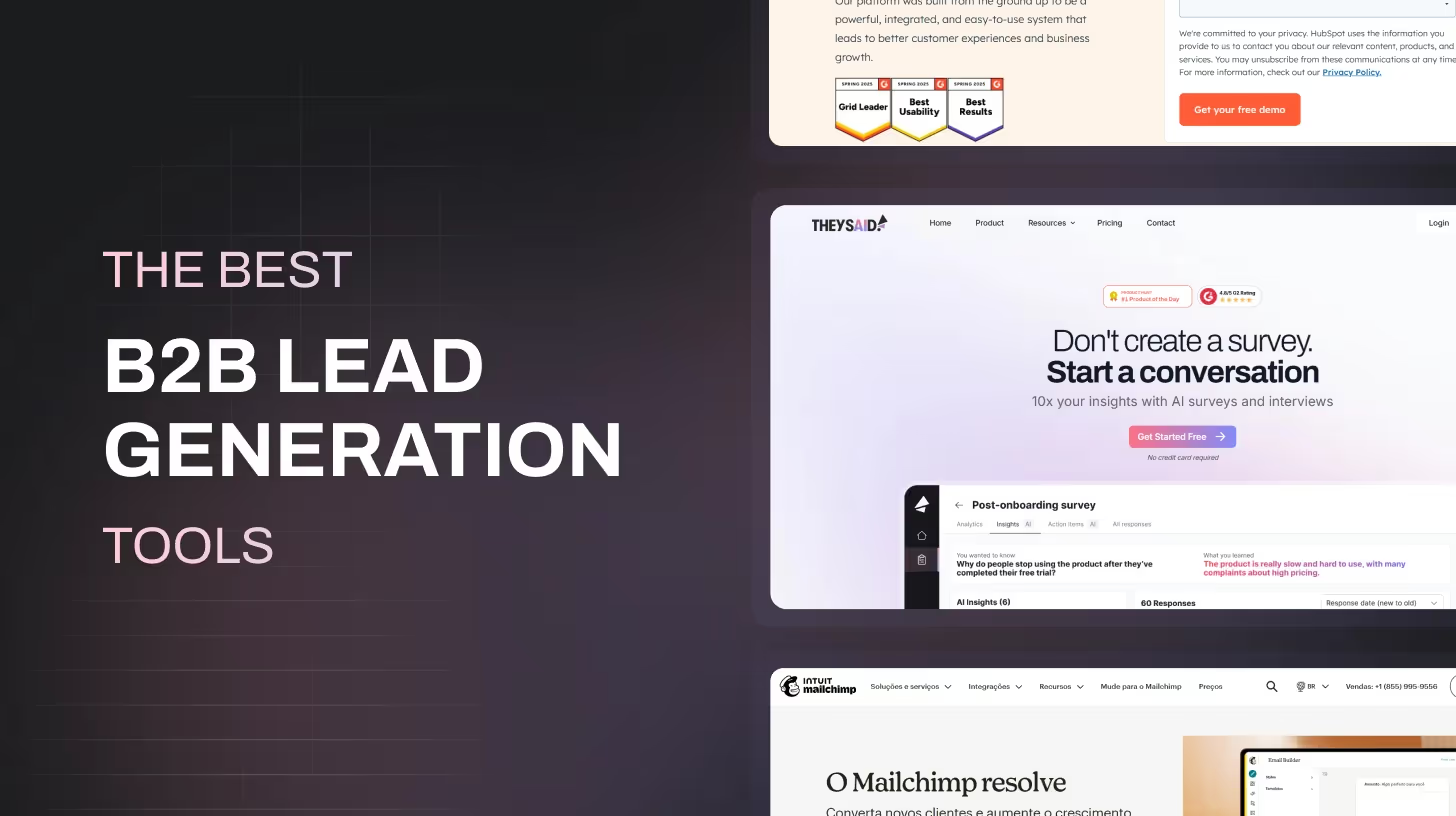
If you’re still using a traditional B2B survey provider, your feedback strategy might be stuck in 2010.
70% of B2B companies collect customer feedback, but only a fraction turn it into action. Why? Because their tools weren’t built for B2B. Unlike B2C, business-to-business feedback involves longer lifecycles, multiple decision-makers, and high-stakes decisions. That’s where B2B survey providers come in. In this blog, we reveal the best tools of 2025 and how they help you turn raw feedback into revenue-driving insights.
What is a B2B Survey Provider?
A B2B survey provider is a platform or tool designed specifically to gather feedback from other businesses, rather than from consumers. Think of it as a feedback middleman designed for serious, high-stakes conversations: product performance, client satisfaction, renewal risk, or why deals are stalling.
They often include features like:
- Account-level reporting to view feedback by company, not just individual respondents
- CRM integrations to connect survey data with sales and customer success platforms
- Advanced logic and segmentation for targeting decision-makers, influencers, and end users differently
- AI-driven insights for identifying churn risks, product gaps, and win/loss drivers
Also read: B2B Marketing Survey 2025: Questions, Examples & Strategy Guide
Top Use Cases for B2B Survey Tools
Here are the most valuable use cases for B2B survey tools in 2025:
1. Win/Loss Analysis
Understand why deals are won or lost by surveying buyers and lost prospects. Get real insights into decision drivers, competitive positioning, and gaps in your sales process.
2. Churn Interviews
Before a customer leaves or right after they hold valuable insights. Use churn surveys to identify common risk factors, feature requests, or unmet expectations.
3. Onboarding Feedback
Survey new clients within the first 30–60 days to catch friction points early. This improves activation, adoption, and customer satisfaction.
4. Product Feedback & Roadmap Prioritization
Collect structured feedback from users, champions, and decision-makers on new features, usability, and value. Align product development with customer needs.
5. NPS & CSAT Tracking
Run regular Net Promoter Score (NPS) and Customer Satisfaction (CSAT) surveys to monitor account health, segment feedback by role, and flag issues before they escalate.
6. Marketing Messaging Validation
Test positioning, value propositions, and campaign messaging with real customers and prospects to ensure relevance and resonance before going live.
7. Quarterly Business Reviews (QBRs)
Use surveys before QBRs to capture sentiment, track success metrics, and come to meetings with data-backed talking points and renewal levers.
Must-Have Features in a B2B Survey Provider
Suggested Read: B2B Survey Panels: Definition, Use Cases, & Market Research Insights
Best B2B Survey Providers in 2025
These platforms are either purpose-built for B2B or are widely adopted by B2B companies with proven features for multi-stakeholder feedback, CRM integration, and actionable insights.
TheySaid (Best Overall B2B Survey Provider)
Built from the ground up for B2B feedback and buyer intelligence.
- AI-powered win/loss interviews, churn analysis, and product feedback
- Designed for B2B sales cycles with multi-stakeholder input
- Strong integrations with Salesforce, HubSpot, and Slack
- Ideal for SaaS, enterprise, and product-led companies
Why It’s #1: Unlike generic survey tools, TheySaid focuses on conversations, not just questions, giving B2B teams 10x the insight with half the effort.
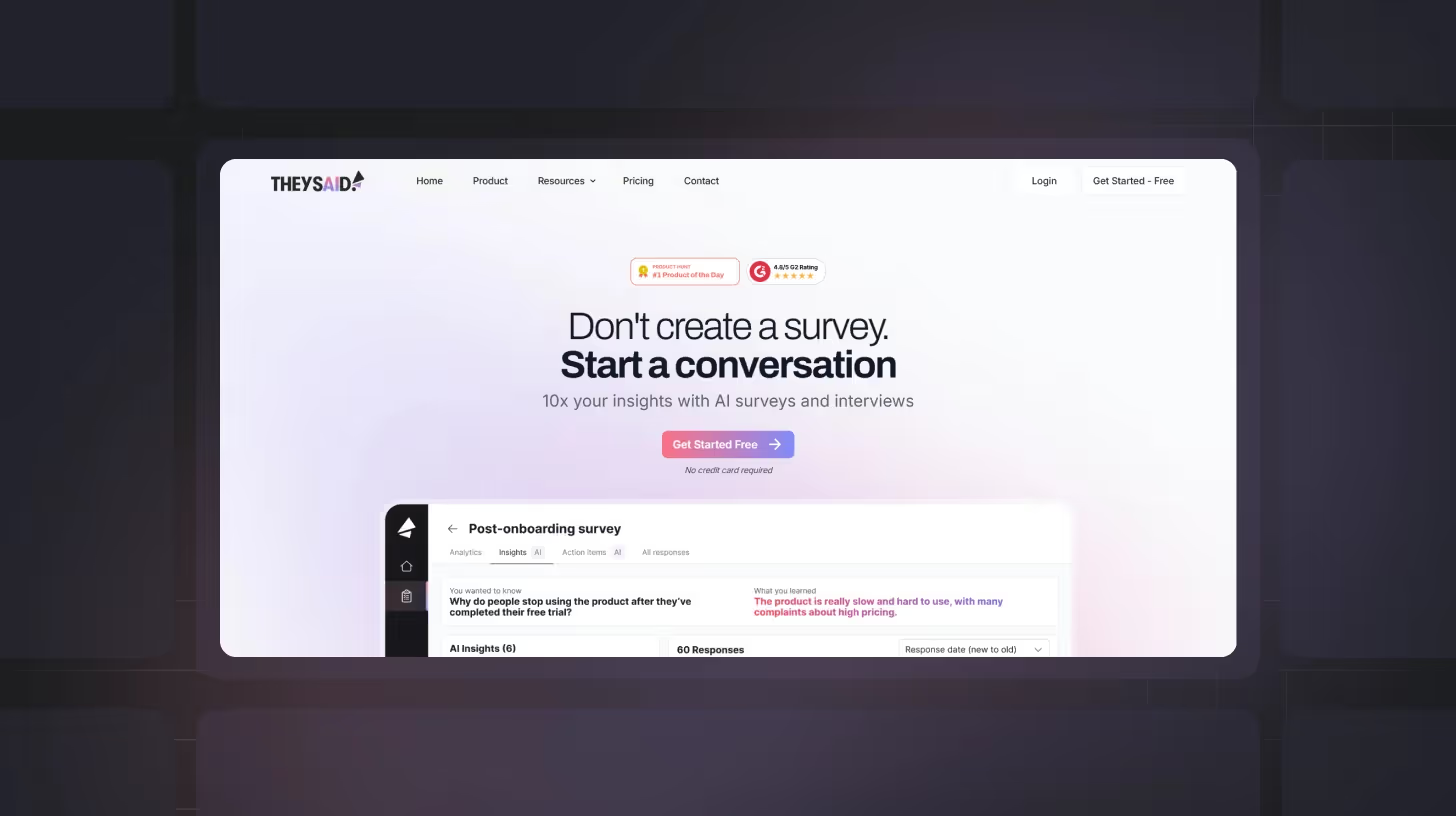
Qualtrics (B2B CX Solutions)
An enterprise leader with specific solutions for B2B customer experience.
- Advanced logic and B2B segmentation
- Full lifecycle feedback: onboarding, renewals, support, and more
- Supports account-level views and multi-contact surveys
Alchemer (formerly SurveyGizmo)
Highly flexible platform used by many B2B organizations.
- Custom workflows and survey logic
- Good for product teams, customer success, and partner programs
- Advanced data export and reporting tools
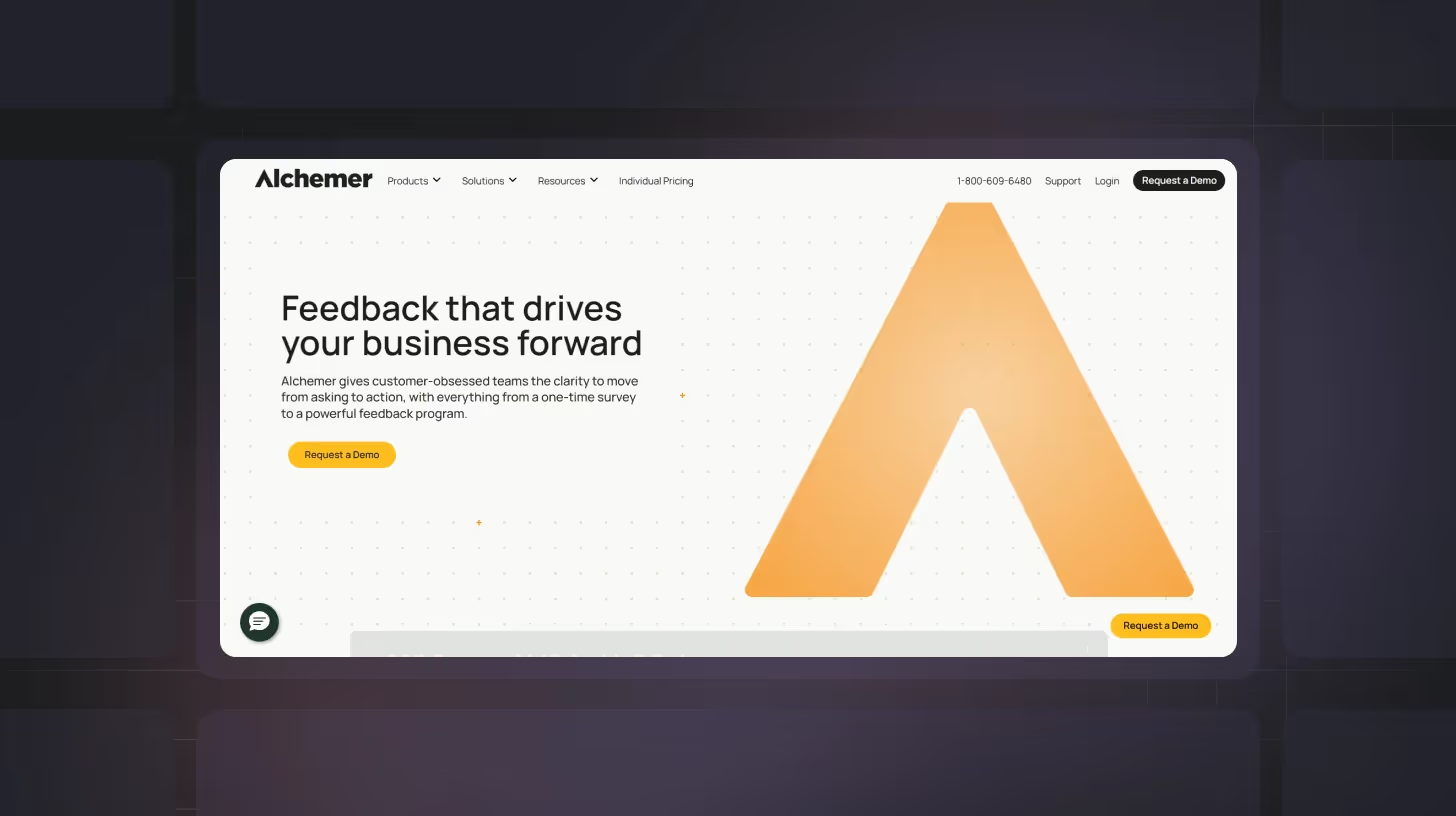
Refiner.io (Best for B2B SaaS in-app surveys and user targeting)
A niche survey tool made for B2B SaaS companies.
- In-app surveys, user segmentation, and targeting
- Track product-market fit, churn risk, and user satisfaction
- Integrates well with CRMs and analytics stacks
UserTesting (for B2B product feedback)
Great for collecting qualitative insights from B2B users.
- Real-time user interviews, task-based testing, and usability feedback
- Supports targeted testing for specific personas and B2B buyers
- Not traditional surveys, but a valuable complement
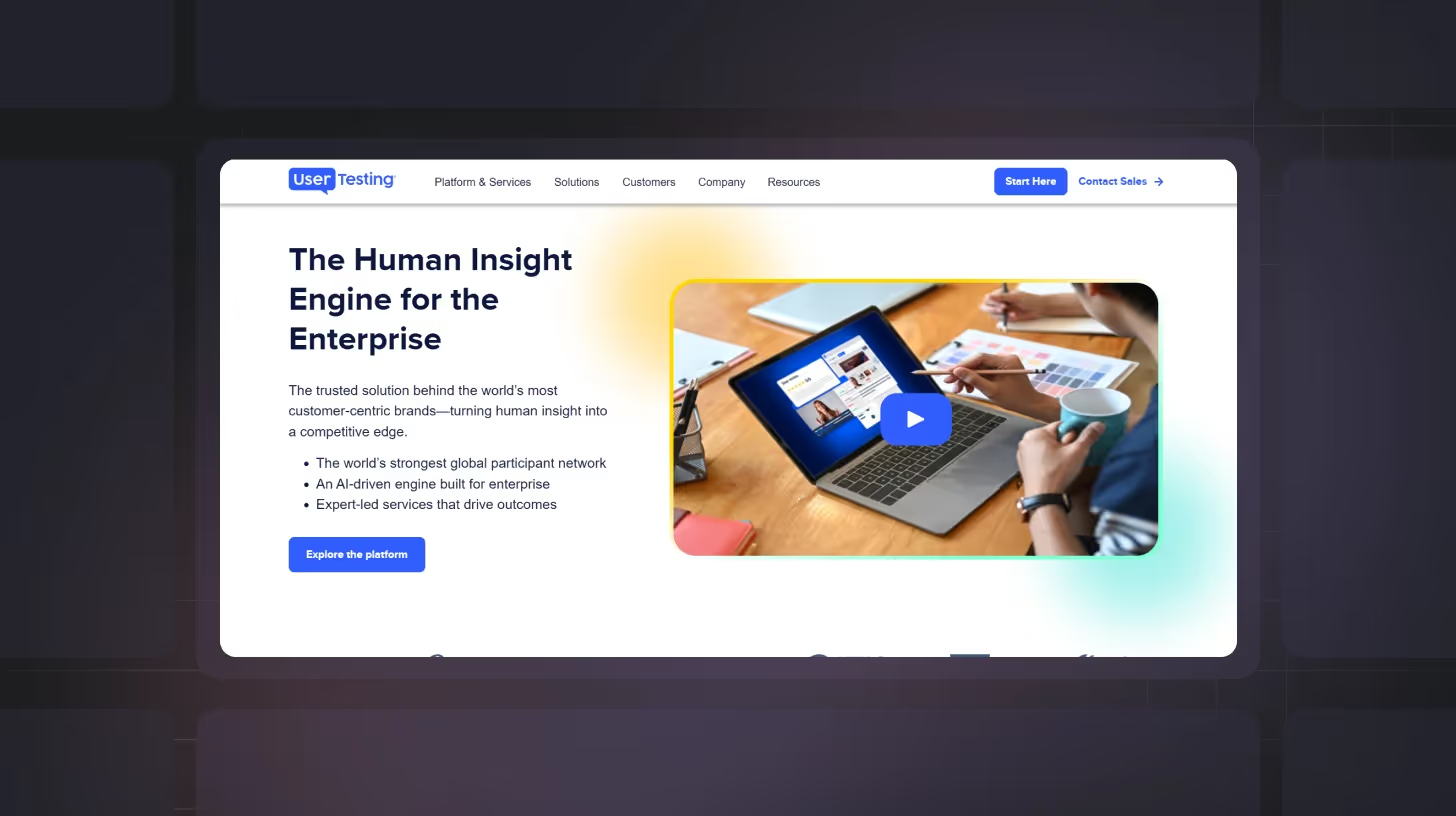
How to Choose the Right B2B Survey Provider
Choosing the right provider means looking beyond basic form builders and asking: Can this tool deliver insights across multiple stakeholders, long sales cycles, and enterprise accounts?
Here’s what to evaluate:
1. B2B-Specific Use Cases
Look for tools that offer templates or workflows tailored to use cases like win/loss interviews, churn detection, onboarding feedback, and product roadmap input.
Pro Tip: Generic NPS tools won’t cut it. B2B requires deeper, account-based insights.
2. CRM & Workflow Integrations
A great B2B survey tool should integrate with your existing tech stack (Salesforce, HubSpot, Gong, Slack, etc.) so insights flow automatically into your daily tools.
3. AI Capabilities
AI can turn messy, open-ended responses into themes, alerts, and next steps. This is especially powerful for unstructured feedback like buyer interviews or churn reasons.
4. Role-Based Logic
The tool should enable you to ask different questions to various roles within the buying committee, such as users, decision-makers, and champions.
5. Account-Level Reporting
B2B teams need to see feedback per account, not just per respondent. The best tools roll up insights by company, segment, or deal stage.
6. Security & Compliance
Make sure the platform is compliant with GDPR, SOC 2, and other relevant frameworks, especially if you're in regulated industries.
7. Actionable Dashboards
Can your sales, CS, and product teams quickly digest and act on the insights? Look for clean dashboards, trend views, and export options.
Also read: How to Design B2B Surveys That Capture Real Buyer Insights
Key Takeaways
- Choose B2B-specific survey tools built for multi-stakeholder feedback.
- Prioritize platforms with AI for faster insights and smarter decisions.
- Look for CRM and workflow integrations to streamline operations.
- Use tools with role-based logic for more personalized feedback.
- Select providers that offer account-level reporting and segmentation.
Conclusion
The right B2B survey provider can transform how you collect, understand, and act on customer feedback. Whether you're in software, healthcare, retail, or education, AI-powered tools like TheySaid make it easier to listen at scale, learn what matters, and lead with confidence. It’s not about more data, it’s about better data that drives real results.
FAQs
What makes a B2B survey provider different from a B2C survey tool?
B2B survey providers focus on complex buying cycles, multiple decision-makers, and account-level insights, unlike B2C tools, which target individual consumers.
How can AI improve B2B surveys?
AI helps generate relevant questions, engage respondents conversationally, analyze feedback faster, and highlight key trends and action items.
Are B2B survey providers safe and compliant with data privacy laws?
Reputable providers follow strict security and privacy standards like GDPR and SOC 2 to protect your data and your customers’ data.






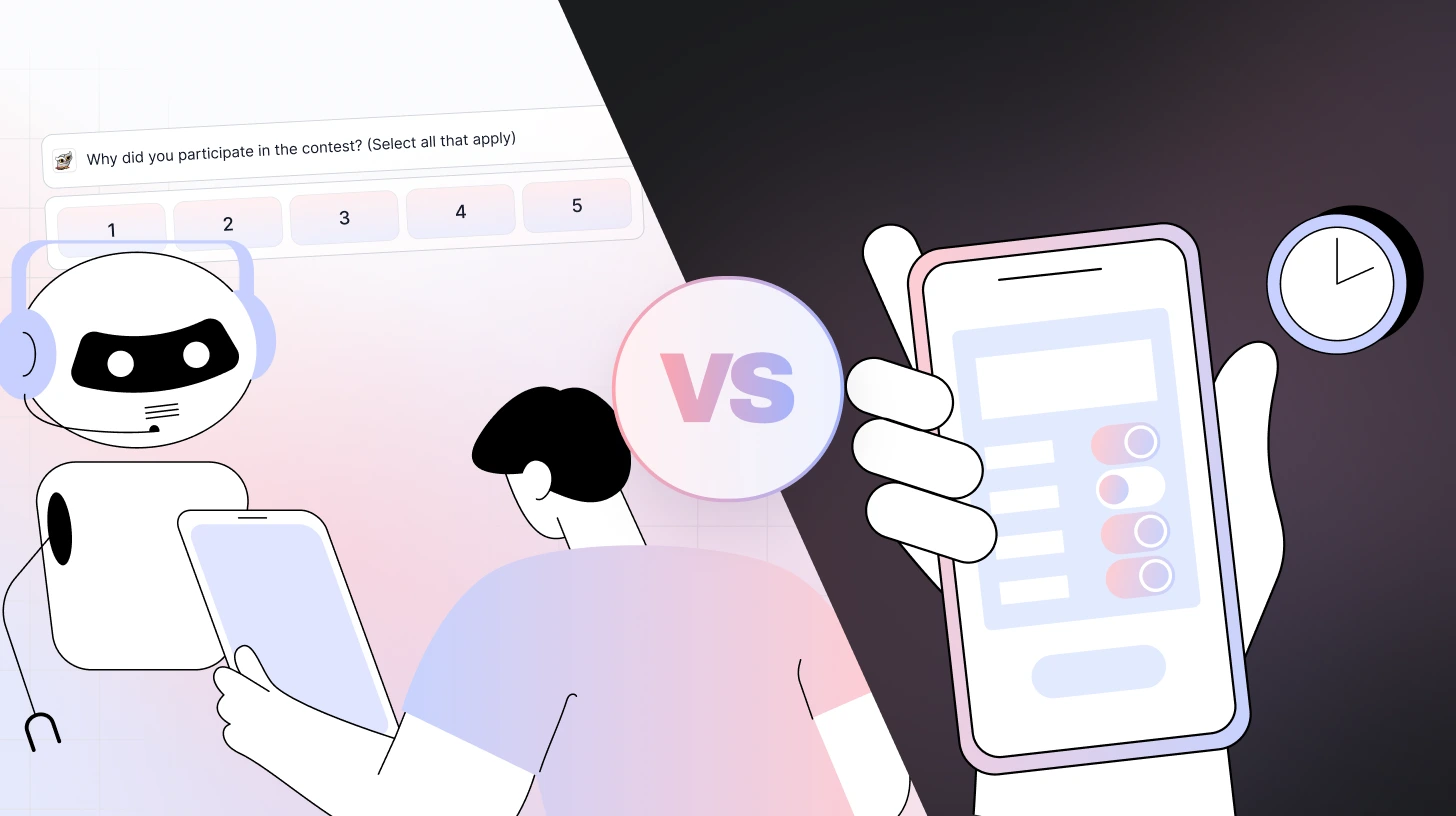









.svg)